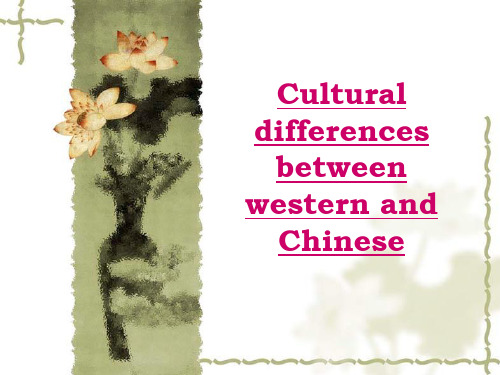cultural-differences
- 格式:ppt
- 大小:2.58 MB
- 文档页数:48

文化差异类作文模板英语Title: Cultural Differences。
Cultural differences are a fascinating and complex aspect of human society. They encompass a wide range of beliefs, customs, traditions, and behaviors that vary from one group to another. Understanding and appreciating these differences is essential for fostering mutual respect and harmony among people from different backgrounds.One of the most prominent cultural differences is language. Each culture has its own unique language or dialect, which shapes the way its members communicate and express themselves. Language not only serves as a means of communication but also reflects the values and worldview of a particular culture. For example, the Japanese language has different levels of formality to show respect, while in English, the use of titles and formal language may not be as prevalent. These linguistic nuances can lead to misunderstandings and misinterpretations, highlighting the importance of cross-cultural communication and language learning.Another significant cultural difference is the concept of time. In some cultures, punctuality is highly valued, and being late is considered disrespectful. In contrast, other cultures have a more relaxed attitude towards time and may not adhere to strict schedules. This can lead to misunderstandings and frustration when people from different cultural backgrounds work or socialize together. Understanding and respecting each other's time orientation is crucial for effective collaboration and relationship-building.Cultural differences also manifest in social customs and etiquette. For example, greetings vary widely across cultures, with some cultures placing a strong emphasis on formal greetings and gestures of respect, while others may have more informal or casual greeting customs. Additionally, dining etiquette, gift-giving practices, and body language can differ significantly from one culture to another. Being aware of these differences and adapting one's behavior accordingly is essential when interacting with people from diverse cultural backgrounds.Religious beliefs and practices are another major source of cultural differences. Different cultures have their own religious traditions, rituals, and ceremonies that play a significant role in shaping their values and behaviors. Understanding and respecting these religious differences is crucial for promoting tolerance and inclusivity in a multicultural society.Moreover, cultural differences can also be observed in gender roles and family dynamics. In some cultures, traditional gender roles are deeply ingrained, with distinct expectations and responsibilities for men and women. In contrast, other cultures may have more fluid or egalitarian views on gender roles. Similarly, family structures and dynamics can vary widely, influencing the way individuals interact with their family members and the broader community.Cultural differences also extend to attitudes towards authority, individualism versus collectivism, and the perception of personal space. These differences can influence how people interact in social and professional settings, as well as their values and priorities in life.It is important to recognize that cultural differences are not inherently good or bad; they simply reflect the diversity of human experience. By understanding and appreciating these differences, individuals can cultivate empathy, respect, and open-mindedness towards others. This, in turn, can lead to more harmonious relationships and effective collaboration in an increasingly globalized world.In conclusion, cultural differences encompass a wide range of beliefs, customs, traditions, and behaviors that vary from one group to another. Understanding and appreciating these differences is essential for fostering mutual respect and harmony among people from different backgrounds. By acknowledging and embracing cultural diversity, individuals can contribute to a more inclusive and interconnected global community.。


Cultural Differences between the East and WestAs we all know, the culture in the east and that in the west are very different.In value judgment, easterners hold the value of collectivism while westerners hold the values of individualism. As the way of thinking, western people think more directly, but the eastern people more obliquely. So while solve a problem, westerners would solve it in a quite direct way while easterners would more likely to detour. Meanwhile, easterners would show their emotions and opinion in a more tactful way than westerners who show then out directly. And for mode of life, westerners prefer live by their own while easterners prefer live in groups. When talking about interpersonal relationship, westerners have much more simply interpersonal relationship than easterners. There are still many different aspects in the culture between the east and the west. And among all these, the value of judgment is one of the most obvious and important differences.It is known that easterners hold the value of collectivism while westerners the values of individualism. That is to say, in east, one should put collective interests in the first place. That is because they believe one would not exist without nationality, society, family or other collective; so one is firstly a person in collectives, and then he is himself. Therefore, the view of oneself in the east is tiny. However, in west, one would usually pay more attention to the realization of personal interests, because in their mind, the societies are established on individual. So, unlike eastern countries, theview of self is great in western countries.In the past years, millions of people argue that the collectivism and individualism which one is better. They all had their own points, and as for me, they are all reasonable. In one hand, any one of us is living in the collective, on one can live without collective; and as a member of a collective, it is reasonable and necessary to attach importance to the congregate interests. But it does not necessary mean that we should give up all our rational interests, we still have the rights to pursue them. Only when our own interest against the congregate one, should we put the congregate one in the first place. In the other hand, it is right for the individualism stress the expression of individuality, independence, liberty, competition, and self-achievement.A society should admit individual value, so that, the whole society could exert its vitality absolutely. In a word, from my point of view, these two types of value are all meaningful and have their own pros.There are many differences between east and west. Different cultures add a colorful element to the world. The cultural gap should not be the obstacle to the civilization of human being. It ought to be the motivation of our going farther. Besides, we can not judge which type of culture is better in our own point of view, because all culture exits in its meaningful way: they formed, developed and exited in a specific culture and social environment.。



Cultural Differences 教案一、教学目标:1. 让学生了解和认识不同国家的文化差异。
2. 提高学生对文化多样性的尊重和包容。
3. 培养学生运用英语进行跨文化交流的能力。
二、教学内容:1. 不同国家的饮食习惯。
2. 不同国家的节日习俗。
3. 不同国家的礼仪规范。
4. 不同国家的人生观念。
5. 跨文化交流的技巧。
三、教学重点与难点:1. 重点:让学生了解和认识不同国家的文化差异。
2. 难点:培养学生运用英语进行跨文化交流的能力。
四、教学方法:1. 任务型教学法:通过小组讨论、角色扮演等活动,让学生在实际操作中学会运用英语表达自己的观点。
2. 情景教学法:创设真实的跨文化交际情境,让学生在轻松的氛围中学习。
3. 互动式教学法:鼓励学生积极参与课堂活动,提高学生的课堂参与度。
五、教学步骤:1. 导入:教师展示不同国家的图片,引导学生谈论各自对图片的观察和感受。
2. 新课内容:教师讲解不同国家的饮食习惯、节日习俗、礼仪规范、人生观念等,让学生了解文化差异。
3. 课堂活动:学生分组讨论,每组选择一个话题,用英语进行汇报。
4. 角色扮演:学生分组进行角色扮演,模拟跨文化交流场景,锻炼运用英语进行交流的能力。
5. 总结与反思:教师引导学生总结课堂所学,鼓励学生在日常生活中多关注和尊重文化差异。
教学评价:1. 课堂参与度:观察学生在课堂活动中的积极参与程度。
2. 口语表达能力:评估学生在角色扮演中的英语口语表达能力。
3. 跨文化交际能力:评价学生在讨论和汇报中展现的跨文化交流能力。
六、教学拓展:1. 组织学生参观博物馆或文化展览,加深对不同文化的了解。
2. 邀请外国专家或留学生来课堂分享他们的文化经验。
3. 开展文化主题的课外活动,如烹饪课程、手工艺制作等。
七、教学资源:1. 教材:选择适合学生水平的英语教材,如《Cross-Cultural Communication》。
2. 多媒体资源:利用PPT、视频、音频等资源,丰富课堂教学。
cultural differences定义
文化差异是指不同文化背景和价值观在行为、信仰、习俗、社会结构等各方面的差异和不同。
每个国家和地区都有自己独特的文化背景和传统,这些文化差异影响了人们的思维方式、行为模式、价值观念等。
文化差异可以包括许多方面,如语言、宗教、道德观念、服饰、饮食、礼仪、观念和习俗等。
举例来说,在一个国家,人们可能会使用不同的语言进行交流,拥有不同的信仰和宗教习惯,对同一个行为可能会有不同的道德评价,喜欢穿着不同的服饰,有着不同的饮食习惯,进行社交时遵循不同的礼仪等等。
文化差异既可以丰富人们的视野,也可能导致误解和冲突。
了解和尊重他人的文化差异是建立和谐社会和促进跨文化交流的重要前提。